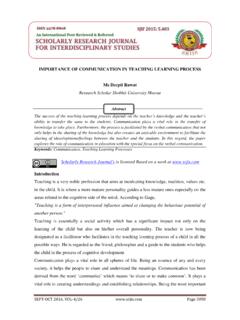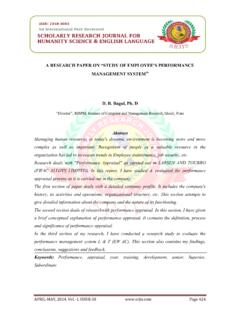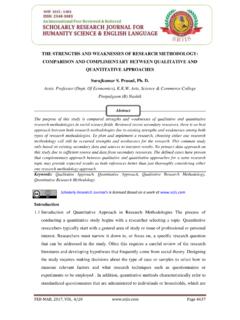Transcription of IMPORTANCE OF COMMUNICATION IN TEACHING …
1 SRJIS/BIMONTHLY/ MS DEEPTI RAWAT (3058-3063) SEPT-OCT 2016, VOL-4/26 Page 3058 IMPORTANCE OF COMMUNICATION IN TEACHING LEARNING PROCESS Ms Deepti Rawat Research Scholar Shobhit University Meerut The success of the TEACHING -learning process depends on the teacher s knowledge and the teacher s ability to transfer the same to the students. COMMUNICATION plays a vital role in the transfer of knowledge to take place. Furthermore, the process is facilitated by the verbal COMMUNICATION that not only helps in the sharing of the knowledge but also creates an amicable environment to facilitate the sharing of ideas/opinions/feelings between the teacher and the students.
2 In this regard, the paper explores the role of COMMUNICATION in education with the special focus on the verbal COMMUNICATION . Keywords: COMMUNICATION , TEACHING Learning Processes Introduction TEACHING is a very noble profession that aims at inculcating knowledge, tradition, values etc. in the child. It is where a more mature personality guides a less mature ones especially on the areas related to the cognitive side of the mind. According to Gage, " TEACHING is a form of interpersonal influence aimed at changing the behaviour potential of another person." TEACHING is essentially a social activity which has a significant impact not only on the learning of the child but also on his/her overall personality.
3 The teacher is now being designated as a facilitator who facilitates in the TEACHING learning process of a child in all the possible ways. He is regarded as the friend, philosopher and a guide to the students who helps the child in the process of cognitive development. COMMUNICATION plays a vital role in all spheres of life. Being an essence of any and every society, it helps the people to share and understand the meanings. COMMUNICATION has been derived from the word communice which means to share or to make common . It plays a vital role in creating understandings and establishing relationships.
4 Being the most important Scholarly Research Journal's is licensed Based on a work at Abstract SRJIS/BIMONTHLY/ MS DEEPTI RAWAT (3058-3063) SEPT-OCT 2016, VOL-4/26 Page 3059 social tool, COMMUNICATION has the power of alteration, negotiation as well as the power to leave a long lasting impact on one s mind. Thus, it needs to be handled carefully to avoid several confusions and controversies. COMMUNICATION though has a major role in all walks of life; it has a further more significant place in the TEACHING learning processes. Research has shown that the TEACHING comprises of mainly two components viz.
5 The knowledge of the teacher and his mastery over the COMMUNICATION skills for the transfer of the knowledge. The either one without the other defeats the meaning as well as the purpose with which it was introduced. A teacher may be very knowledgeable, but this knowledge will not serve the purpose unless it is transferred in a manner it is intended to. On the basis of the medium, COMMUNICATION had been divided into two parts viz. Verbal COMMUNICATION and the non verbal COMMUNICATION .. Verbal COMMUNICATION involves the use of the language whereas the non verbal COMMUNICATION is essentially based on the use of expressions, gestures, actions etc.
6 Both the forms of the COMMUNICATION are extremely important for complete transfer/understanding of the content yet when it comes to the TEACHING learning processes, verbal COMMUNICATION plays a much more vital role in the transfer of the knowledge. Defining COMMUNICATION What is COMMUNICATION ? According to the Concise Oxford Dictionary the word means the act of imparting, especially news , or the science and practice of transmitting information . COMMUNICATION has been defined as The process of transmitting information and common understanding from one person to another (Keyton, 2011).
7 Thus COMMUNICATION may be understood as a way of transferring thoughts, ideas, opinions and knowledge from the sender to the receiver. According to Hybels and Weaver (1995), the COMMUNICATION process is made up of various elements: sender-receiver, messages, channels, noise, feedback, and setting. Shannon and Weaver (1963) diagrammed COMMUNICATION and identified the process as involving an information source, a message, transmission or encoding of the message, a signal, a channel, a receiver or decoder of the message, a destination, and noise. COMMUNICATION has been discussed as a two way process where the information is transferred across from the sender to the receiver wide a proper medium.
8 The choice of the medium SRJIS/BIMONTHLY/ MS DEEPTI RAWAT (3058-3063) SEPT-OCT 2016, VOL-4/26 Page 3060 depends on the choice of the sender. The sender selects the medium, and sends the message across the receiver, who in turn decodes the information received, understands it and sends a suitable reply or feedback back to the sender. COMMUNICATION is thus the process of sharing our ideas, thoughts, and feelings with other people. The process of COMMUNICATION may be seen in the diagram given below. Role of COMMUNICATION in Education Education is regarded as the most important tool in the improvisation of the society and COMMUNICATION plays a vital role in the education process.
9 COMMUNICATION helps to transmit the knowledge from the sender (the teacher) to the receiver (student) apart from the sharing of other ideas, thoughts and opinions. The diagram given below gives a glimpse of the classroom COMMUNICATION : Source: (Prozesky, 2000) Azam & Kingdon (2014) reported in a study that teachers matter a great deal as far as achievement of students is concerned. Apart from the basic knowledge, the effective COMMUNICATION plays a major role in motivating the students, knowing their aspirations and the problems that they may have. Though, both the verbal and the non verbal COMMUNICATION play a vital role, yet an effective verbal COMMUNICATION helps in building a strong teacher student relationship which acts as a platform for the strong cognitive development.
10 Easy and effective verbal COMMUNICATION helps the teachers to get an insight into the child s thoughts/ideas/opinions/issues whereas the students get the knowledge of the teacher s expectations, knowledge and skills . This open environment lays a strong foundation for a healthy classroom environment based on mutual trust and respect. COMMUNICATION takes place through channels. Within the TEACHING profession, COMMUNICATION skills are applied in the teachers classroom management, pedagogy and interaction with the class (Saunders and SRJIS/BIMONTHLY/ MS DEEPTI RAWAT (3058-3063) SEPT-OCT 2016, VOL-4/26 Page 3061 Mills, 1999).





